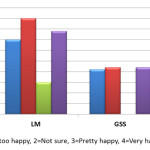 Marriage is a hot topic these days, from gay activists fighting for equality to the conservative right insisting marriage is the very foundation of civilization and allowing gay marriage is a sign of the destruction of society. Then there is the slippery slope argument that if we allow same sex marriage it will lead to legalized polygamy and “oh my god” polyamory. Not to mention people will want to marry children and animals next. It is all very confusing as people polarize over the institution of marriage. How many people actually look at the institution of marriage, its symbolism and whether it fits our modern relationships? Why do most people simply accept this tradition as being the ideal relationship commitment or end goal of any serious romantic connection? Is sentimental attachment enough of a reason to hold on to an institution that is outdated and, at its roots, is based in slavery?
Marriage is a hot topic these days, from gay activists fighting for equality to the conservative right insisting marriage is the very foundation of civilization and allowing gay marriage is a sign of the destruction of society. Then there is the slippery slope argument that if we allow same sex marriage it will lead to legalized polygamy and “oh my god” polyamory. Not to mention people will want to marry children and animals next. It is all very confusing as people polarize over the institution of marriage. How many people actually look at the institution of marriage, its symbolism and whether it fits our modern relationships? Why do most people simply accept this tradition as being the ideal relationship commitment or end goal of any serious romantic connection? Is sentimental attachment enough of a reason to hold on to an institution that is outdated and, at its roots, is based in slavery?

Marriage, as right wing conservatives tout it, is a religious institution, a covenant with God between one man and one woman. If we look at marriage through Judeo/Christian traditions, marriage is about property and ownership of women. A woman is given to a man in marriage by her father. The rights of marriage in the religious context have more to do with property rights and the paternity of offspring. Many modern marriage ceremonies still pronounce a couple “man and wife” instead of “husband and wife”. This implies that the man is autonomous and he has taken a wife. Many religious ceremonies still include the vows for a woman to “love, honor and obey” her husband. Women still are walked down the aisle most often by their father and “given” away in marriage. This is very symbolic of women as property being sold by their father or family. Women, often without question, take their husbands name and are announced “Mr. and Mrs. So and So”. In traditional marriage the symbolism is clear; the woman is given in marriage and loses autonomy to her husband.
Though many women now keep their name and are very independent, the symbolism of the traditional marriage ceremony are clearly about property rights. When two people obtain a marriage license and marry, they are subject to a long list of property, contract and marital laws. It can vary greatly from state to state and the laws can change during the marriage. When you apply for a marriage license you are not given a copy of the legalities you are entering into. Not only is it a commitment between you and your chosen partner but you are subject to the marriage laws of whatever state you live in or move to. If you marry in a community property state you are now giving half of all your belongings to your spouse and taking on half of any debt they have. When you are applying for the marriage license you are by proxy agreeing to all the marriage laws of that state but also agreeing to any changes the state makes to the law in the future. Of course people can create a prenuptial agreement but most people consider this unromantic. The truth is marriage is a contract and in the not so distant past it was recognized as such, two families joining for political and financial reasons.
Looking at the past, much traditional marriage came from necessity. To form a patrilineal or patriarchal culture, women’s sexuality must be controlled to guarantee paternity. Marriage was often about survival; economically, politically or otherwise. Many marriages were arranged for this reason. There was often money involved; at times parents would buy a marriage for their daughter and in other times men or their families bought wives. Wealthy men could have more than one wife and to do so was sign of status. Having concubines was also fine. What was not fine was having sexual relations with another man’s wife, to do so was to adulterate or pollute the family line and covet (steal) a man’s property. This is where the term adultery comes from. Laws on fidelity and adultery in early Bible times were all about insuring paternity. Women being stoned to death for being “unclean”, meaning she had sex with someone whether forced of voluntary, insured she did not have a child with the wrong paternity.
In a modern culture where concerns about political alliance and basic survival are not at stake, do the traditions still serve us? Why do we continue to brainwash people, especially women, about the “romantic happily ever after” that we teach equals marriage? Why do we still see marriage as the only valid commitment? Adults often still allow the pressure exerted by family to push them into marriage when they might not have chosen that. We measure relationship success by a marriage license from the state and longevity rather than the quality of the interactions or the growth and learning received from a relationship.
 When a woman is walked down the aisle, given away in marriage and changes her name, essentially her identity, is it any wonder she changes or is no longer the independent outgoing person she once was? For many women the years of programming kick in and she starts to subdue her wants and needs as a sacrifice on the altar of marriage. Jane Fonda who is an outspoken, powerful woman has talked openly about her own struggle of, as she put it, becoming a pretzel in marriage in an attempt to be a “good wife”. Many women can identify with this.
When a woman is walked down the aisle, given away in marriage and changes her name, essentially her identity, is it any wonder she changes or is no longer the independent outgoing person she once was? For many women the years of programming kick in and she starts to subdue her wants and needs as a sacrifice on the altar of marriage. Jane Fonda who is an outspoken, powerful woman has talked openly about her own struggle of, as she put it, becoming a pretzel in marriage in an attempt to be a “good wife”. Many women can identify with this.
Conscious agreements in the form of Civil Unions between consenting adults make sense for modern relationships. Instead of state sanctioned marriage people could form a Civil Union and be required to write out their agreements in a contract that works for all parties. It could even be written to require a renewal every year, two years, five years or whatever works for those individuals. Civil Unions could include more than two people and gender would be a non issue. As marriage laws are now, they are based on religious doctrine and romantic notions. The state has no business in a religious ritual or tradition.
Civil Unions have the possibility to become a legal solution to issues of property and rights. Relationship commitments do not need to be sanctioned or recognized by the state, however laws regarding partners rights, property and child custody do need legal agreements. It would be common sense to allow human beings the freedom to love and form Unions with who they choose regardless of gender. Children born to a union should be protected by contracts and an agreement made when all parties are on good terms, instead of arbitrary fights about issues no one thought of when they were high in the early stages of being in love.
Marriages sanctioned by the church and subject to religious doctrine would still be performed but kept in the church where marriage, as a religious institution, belongs. Even with religious marriage the state could require a Civil Union agreement to recognize the legal rights of that union. Civil Unions could have provisions for dissolving the union, just as many legal partnership agreements have. Dissolution of marriage would be done by the church under which the marriage was performed and sanctioned and not required to dissolve the legal Civil Union.
Many people have strong attachments to the institution of marriage and the romantic imagery associated with it. Marriage as it has been traditionally may not be healthy for modern relationships. Women are no longer property but this is a relatively recent liberation. Until the mid seventies a woman could legally be raped by her husband. The roots of marriage traditions run deep and psychological wounds are still there and fresh. Creating something new and better suited to modern relationships, culture and equal partnership seems logical when we let go of our attachment to romanticized traditions. Rational and conscious negotiation might improve the stability of unions and even create an atmosphere of acceptance of different kinds of unions. After all, people are different and have different needs whether it’s in a career, where to live or what kind of love relationship one chooses. Choices and options can offer people more fulfillment and possibly relationships based on adult needs and children’s needs instead of romantic whims.
Marriage has its roots in antiquity and was created for a different culture and different time; why do we assume it could work at all in our modern world of relationships? No matter what a person’s background is or what their lifestyle choice, commitment and love are very personal journeys. Marriages or Civil Unions are a way of defining a commitment but also a legal obligation. As such it is important for people to step back and look closely at what a ritual or ceremony symbolizes as well as the legal agreements that are part of any legalized or licensed contract. Consciously assessing the meaning of what a Union is and the legal commitments that go along with it, as well as what rituals and traditions a person wants to participate in, could be healthy and healing both to individuals and to society as a whole.








I loved this article, Robyn. Very nicely done.
Since I became interested in polyamory in 1997 I have found the idea of marriage unappealing. To combine love with the government feels a bit Orwellian. Love is so juicy & the government is so dry 🙂
I’ve also felt that because I would like to love more than one person, it would create an inherent imbalance if I were married to only one of them…since 1 is currently the limit.
Regarding the perpetuation of the “happily ever after” perspective, I’ve often felt that it relates to consumerism. Images in advertisements, tv shows, and movies related to “the pursuit of marriage” may be motivated in part by many married people (after the thrill of the honeymoon wears off) turning to buying things, watching television & going to films to give their life “spice.” The nuclear family in the eyes of the media is no more than an economic unit 🙂
This article might well be more persuasive if it were not so incomplete. No discussion of marriage as a social institution can be comprehensive (necessary for informed discussion of the issue) without addressing the issue of society’s compelling interest in the welfare and best interests of any children which might arise from physically intimate but non-monogamous relationships.
Of course, avoidance of that topic is necessary if the negative portrayal of traditional marriage is the intent of the article. Which is clearly the author’s bias, given the article’s incessant condemnation of traditional marriage with only warped stereotypes of traditional marriages illustrated.
It’s fine for advocates of polyamorous relationships to advocate upon their behalf, it’s intellectually dishonest however to pose advocacy within a framework which completely avoids society’s most important consideration of the issue, while simultaneously misconstruing both the intent and the ideal of the institution.
Which is meant to be, at least in modern western society, as the committed union of two equals. However much men and women may stray from that ideal does not invalidate the ideal but just proves how fallible human beings are when trying to live up to an ideal. Ideals are principles and life lived without allegiance to relevant principles, inevitably devolves into narcissistic impulse.
Ideally, the optimum home environment for any child consists of the biological parents in a loving, committed parental relationship, which may or may not be monogamous but any polyamorous arrangement which does not include the full parental involvement and commitment to offspring that traditional monogamous marriage requires is inherently disadvantageous to any child born of the alternative relationship advocated.
As long as advocates of polyamory avoid the deepest issues upon which societal concerns regarding marriage consist, society will view non-monogamous relationships as problematic at best.
Well said Robyn,
I have been blogging about this issue for a while and I recently came across another Poly article recently on marriage that did not seem to understand the issues at all…..getting past all the romantic mumbo-jumbo feels like an uphill struggle.
>>Many people have strong attachments to the institution of marriage and the romantic imagery associated with it.
As a non married member of a triad, I have keenly felt the injustice of monogamous dyadic marital laws and I really think we should stress the use of modern terms and contractual solutions for our families rather than marriage. How can we really claim to be a really radical movement when we buy into such a fundamentally monogamous institution?
>>Until the mid seventies a woman could legally be raped by her husband.
I just wanted to point out that here in the UK, marital rape was not made illegal until 1992 I believe, I was in college at the time and remember the situation rather well.
>>Ideally, the optimum home environment for any child consists of the biological parents in a loving, committed parental relationship, which may or may not be monogamous
‘@Geoffrey
We have had very, very, little other positive challenges to traditional nuclear family dynamics in the Western world. Besides which, romantic marriage is a recent creation, not many people would claim that marriage was necessarily best for a child if it was still a purely financial dynastic contract. To say it is the best, when people have had very little exposure to Poly/group parenting is disingenuous. So far, most mainstream exposure to non traditional families are negative featuring women especially in a weaker position (i.e. Patriarchal Polygamy) or economically disadvantaged (teenage single mothers) Occasionally, very stable but older grandparents raising their grandchildren because the biological parents are indisposed (often imprisoned or committed). So no, not the best start to any childs life but…..these are problems within a mainly monogamous community rather than anything to do with Polyamory. WE haven’t been tested yet, do not be so quick to deem us a failure in front of the all powerful Marital Dyad .
BTW as the daughter of a single parent who never felt impoverished, I know from first hand experienced that I ‘never’ felt I was lacking but society (much like yourself) always liked to tell me I was. Part of the problem is the media always shows its ideal and the exceptions are almost always shown in such a negative light that no wonder that so many children and young people, those who may not have the same level of stubborn radicalism that I happen to have, feel that they are being hard done by.